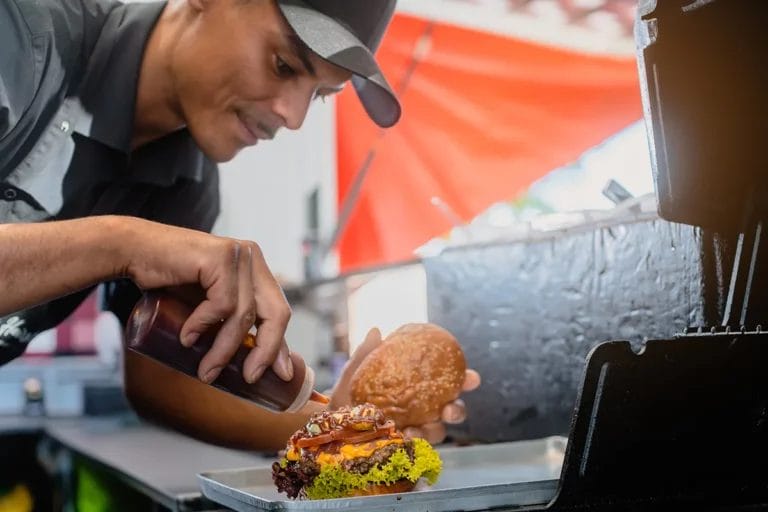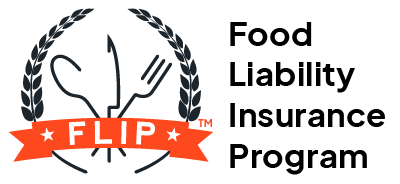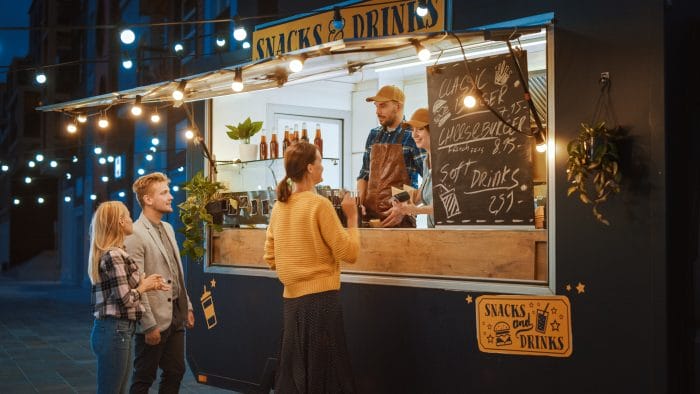If you’re starting a food truck in the Evergreen State, you’re in for an exciting adventure. Of course, your journey starts with tasks like getting permits, understanding the costs, and knowing how to protect your business from liability claims.
That’s what this guide is for: to help you navigate requirements and regulations so you can hit the road and serve customers with confidence!
Understand Washington State Food Truck Requirements
There are a few details to sort out before you start applying for licenses and permits:
- Business name: Your name should be catchy and unique, but easy for customers to remember and understand what type of food or beverage you offer.
- Business classification: This affects how your business is structured and how you pay taxes. Choose between a sole proprietorship, limited liability company (LLC), joint venture, etc.
- Employer identification number (EIN): You get this number when you register with the Internal Revenue Service (IRS), which uses it for tax purposes.
- Certificate of Insurance (COI): Otherwise known as your proof of insurance, this document contains essential details about your food liability coverage, such as your policy limits.
- Business plan: Your business plan isn’t just essential to planning for the future and staying on track to hit your goals. It’s also something money lenders and even venues ask to see before issuing a loan or working with you.
Obtain Washington State Food Truck Licenses
Once you have the foundation of your business set up, you’re ready to start applying for the licenses and permits you need to operate your food truck in Washington.
It’s important to note that, while some licenses are required by the state, cities and counties have their own permitting requirements you must follow. Don’t forget to check your local government’s website for details about which licenses you need. If you operate in multiple cities or counties, follow the rules and regulations in each of them.
Business License
- Registers your food truck in the city you do business in (if you operate in multiple cities, you need a license for each)
- Cost: $90 for initial registration with a $10 annual renewal fee
- Where to get it: Washington State Department of Revenue (DOR)
Health Permit
- Issued by your county health department following a passing health inspection
- Cost: Varies depending on the county
- Where to get it: Your county health department
Fire Permit
- Required by the Washington State Association of Fire Marshals (WSAFM) to ensure your food truck doesn’t pose a fire hazard
- Cost: Varies depending on location
- Where to get it: WSAFM’s Statewide Food Truck Inspection Program
Food Handler’s Permit
- Required by the state for anyone who preps, cooks, or handles unpackaged food within 14 days of starting employment
- Cost: $10
- Where to get it: Washington State Food Worker Course
Certified Food Protection Manager (CFPM) Permit
- At least one employee must have this permit to make sure someone on-site is in charge of training and enforcing food safety protocol
- Cost: $121
- Where to get it: Learn2Serve
Mobile Food Facility Permit
- Required for mobile food businesses classified by Washington as food trucks or trailers; involves an inspection of your vehicle
- Cost: Varies depending on the county
- Where to get it: Washington State Department of Labor & Industries
Pro Tip: The DOR’s Business Licensing Wizard is a helpful tool that asks a series of questions about your business to determine which agencies you need to contact, additional endorsements you might need, and other helpful information for food truck owners.
Follow Food Truck Laws in Washington State
Washington state has passed several food truck regulations intended to ensure that food trucks operate safely and don’t pose a risk to public health. Violating these laws, even by accident, can result in a fine, license suspension, or even a permanent business closure, so it’s critical to be aware of them.
Here are a few laws every food truck owner should know:
- Commissary kitchen requirement: Many Washington food trucks are required to rent a commercial kitchen for food preparation and storage unless they meet exemption criteria.
- Zoning laws: Each city/county has its own zoning laws that dictate where you can run your food truck. Always look up where you’re allowed to sell food from your food truck before you park it in a new city (usually specific public and commercial spaces).
- Distance to employee restroom rule: The State Board of Health requires food trucks to park no further than 500 feet from a restroom that employees are permitted to use. This rule applies whenever the food truck is in operation at a location for more than an hour.
- Alcoholic beverage restrictions: Washington state allows food trucks to serve alcohol if they are hired to cater by a non-profit for a special event. To do this, you must obtain a catering health permit (separate from your food truck health permit) and add a liquor addendum to your state business license.
Get Washington State Food Truck Insurance
Having food truck insurance is essential for Washington businesses, and not just because many states and counties require it. A single claim could cost you thousands, and food trucks face a wide range of risks.
For instance, if a customer gets food poisoning from something you sold them and ends up in the hospital, they could sue you to cover their medical bills and lost wages. Or, if your food truck leaks oil on the new asphalt at a venue, the manager could demand that you pay for cleanup.
On average, food truck claims like these cost $6,271. Most business owners can’t afford to pay this surprise expense out of pocket.
That’s where Washington food business coverage from Food Liability Insurance Program (FLIP) can help. Our policy is designed to cover some or all of the cost of the most common claims you face as a food truck owner, allowing you to focus on growing your business instead of stressing about accidents.

Learn the Cost of Starting a Food Truck in Washington State
The total cost of starting a food truck business can range anywhere from $50,000 to $300,000.
While permits and licenses make up some of the expense, you should also factor these costs into your budget and financial planning:
- Food truck
- New: $75,000–$150,000
- Used: $30,000–$80,000
- Custom-branded wrap: $2,500–$5,000
- Cooking equipment
- Grill or griddle: $2,500
- Deep fryer: $1,200
- Convection oven: $1,000–$3,500
- Microwave: $250–$800
- Refrigeration
- Refrigerator/freezer combo: $2,000–$5,000
- Prep table with refrigeration: $1,000–$3,000
- Safety and sanitation
- Three-compartment sink: $1,000–$2,500
- Handwashing sink: $200–$500
- Fire suppression system (required by the state): $1,500–$3,000
- First aid and personal protective equipment (PPE): $100–$300
- Power supply
- Generator: $3,000–$10,000
- Backup power: $500–$2,000
- Technology
- Point of sale (POS) system: $1,000–$3,000
- Inventory software: $20–$200/month
- Tablet: $300–$1,000
- WiFi or mobile hotspot: $100–$300
Pro Tip: Running a food truck is costly. Make sure you’re breaking even and making a profit with a strong menu pricing strategy!
Sell at Washington Food Truck Festivals
Food truck festivals are a great way to expand your customer base and meet other food truck owners in your area.
Here are some of the most popular festivals for food trucks in Washington state:
Pro Tip: Check out our food festival directory for more Washington foodie events to add to your roster!
FAQs About Starting a Food Truck Business in Washington State
Does Washington State Have a Food Truck Association I Can Join?
Yes! The Washington State Food Truck Association (WSFTA) is a group of food truck owners and lobbyists that offers exclusive resources to its members, including a spot on their Food Truck Directory. This makes it easier for individuals and organizations to find and book you for their events.
How Profitable Can a Washington Food Truck Business Be?
The average food truck owner makes $114,472 in the U.S., but the amount you make can vary depending on factors such as:
- The amount of competition in your area
- Your profit margins
- The number of customers you serve every year

Alex Hastings
Seattle-based copywriter and (WA) licensed insurance agent Alex Hastings leverages her experience as a lover of fast-casual food, baked goods, and iced oat milk lattes. She holds a B.A. in Creative Writing from Western Washington University. Before working at Veracity, she was a retail copywriter at Zulily and an English language teacher in South Korea. Alex is fully trained on FLIP insurance coverages and writes content that connects food and beverage business owners with the policies they need.
Seattle-based copywriter and (WA) licensed insurance agent Alex Hastings leverages her experience as a lover of fast-casual food, baked goods, and iced oat milk lattes. She holds a B.A. in Creative Writing from Western Washington University. Before working at Veracity, she was a retail copywriter at Zulily and an English language teacher in South Korea. Alex is fully trained on FLIP insurance coverages and writes content that connects food and beverage business owners with the policies they need.

Kyle Jude
Kyle Jude is the Program Manager for Food Liability Insurance Program (FLIP). As a dedicated program manager with 10+ years of experience in the insurance industry, Kyle offers insight into different coverages for food and beverage business professionals who are looking to navigate business liability insurance.
Kyle Jude is the Program Manager for Food Liability Insurance Program (FLIP). As a dedicated program manager with 10+ years of experience in the insurance industry, Kyle offers insight into different coverages for food and beverage business professionals who are looking to navigate business liability insurance.

